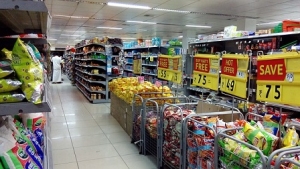 The world is facing an ever-increasing water scarcity problem partially due to global warming and climate change, and partially due to a burgeoning population, but while most individuals are aware and trying to use less water, we have to ask, are food companies prepared for global water scarcity?
The world is facing an ever-increasing water scarcity problem partially due to global warming and climate change, and partially due to a burgeoning population, but while most individuals are aware and trying to use less water, we have to ask, are food companies prepared for global water scarcity?
Let’s face it, how much does it really matter if you and I, and even our local municipalities are instituting water-saving measures if the biggest water users, the food and drink production companies are not doing the same?
Are Food Companies Prepared for Global Water Scarcity?
According to a recent study conducted by Ceres, a sustainable business consortium based in Boston, the answer is an emphatic NO!
According to the research they conducted, released in a report in May 2015, most food companies aren’t prepared to deal with the water risks and this will most likely result in an increase in global food prices, which have been steadily rising since 2012.
According to Brooke Barton, the report’s co-author and director of the Ceres water program, We are coming to an end of cheap, plentiful water. Most of the food companies assume that water will remain cheap, and for investors that assumption is dangerous in terms of the companies’ long term profitability. We feel that most companies are not addressing these risks adequately.
What most of us may not realise is that according to the United Nation’s Food and Agriculture Organization, food production constitutes approximately 70% of the world’s water use.
[Source FAO] Water is utilised in everything from raising animals to growing crops, which means that everything we eat, from the bacon we have for breakfast to the pizza that we snack on takes water to produce.
According to the Water Footprint Network, a Netherlands non-profit that consults on water management and policy, it takes a whopping 15,415 litres of water to produce just one kilogram of beef and 1,850 litres of water to produce a kilogram of pasta.
What is worse is that around 33% of global food production takes place where water-scarcity is becoming a reality and if Business does not make more of an effort to better manage water, from reducing their water pollution from fertiliser runoffs and other agricultural and production processes to implementing conservation plans and also tracking their suppliers’ water use.
According to the report from Ceres, 31 out of the 37 companies they checked in their study ranked less than 50 out of 100 on their water management. This shows that if businesses do not so something about their water management in a hurry, we are not only going to be faces with water shortages sooner than later, but also with food shortages and food prices that will spiral out of the range of most, meaning that only the rich will be able to afford to eat.
Get bottled water coolers and mains fed water coolers from Living-Water in London.





